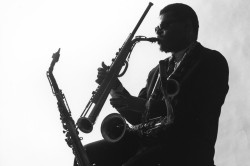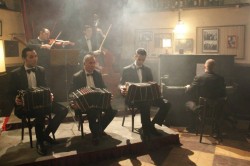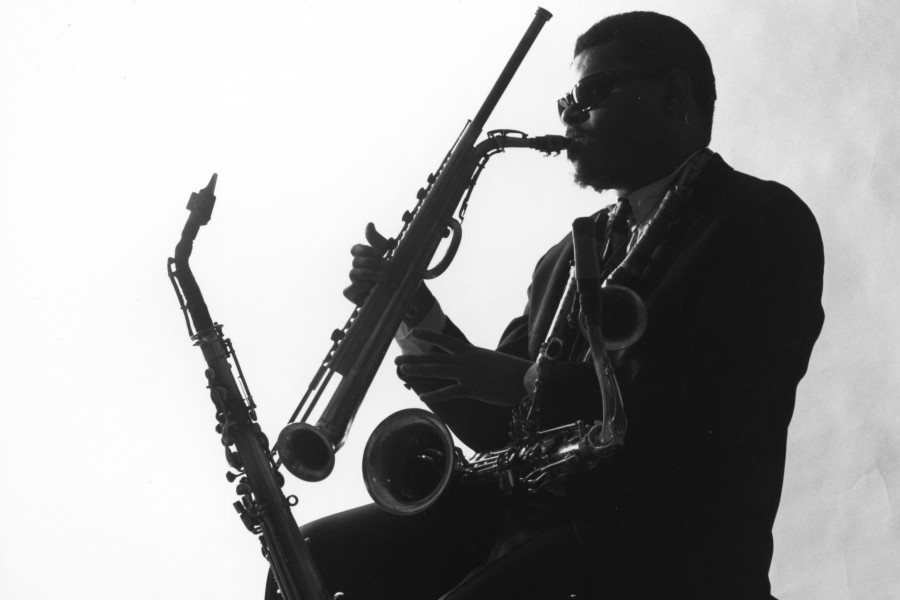Last year could have been Filmfest DC’s final act. A projected $250,000 deficit threatened to sink the annual film festival after 2014, as festival director Tony Gittens told Washington City Paper at the time. But after that somber declaration, Filmfest DC got an unexpected second wind. A combination of donations and financial restructuring helped the fest rebound, DCist reported, and now Filmfest DC returns April 16 with another diverse slate — with no shortage of films about music.
Filmfest DC’s 2015 offerings include two music categories: “Reel Jazz” and the hybrid concert/film series “Rhythm On And Off The Screen.” Subjects range from calypso stars (The Glamour Boyz Again) to steel drums (PAN! Our Music Odyssey) to fascinating figures in jazz (Be Known: The Mystery of Kahil El’Zabar).
But with such an eclectic lineup, the fest might leave casual filmgoers with no natural starting point. So our critic Andrew Lapin looked at one film from both music categories. He found one documentary worth the reasonable $13 admission, and another that doesn’t rise to the level of its $45 admission price on opening night. — Ally Schweitzer
Check out FilmFest DC’s complete 2015 schedule at filmfestdc.org.
See: Rahsaan Roland Kirk: The Case Of The Three-Sided Dream
It’s quite a sight — and sound — when, with three saxophones already strapped to his shoulder, blind jazz master Rahsaan Roland Kirk reaches over them and pulls out a flute. Or when he’s in close up and so many reeds are hovering in the frame that one drifts toward his nose… and then enters it, and he plays through his nostril while chatting away with the audience.
Jazz purists have argued that Kirk’s style isn’t a display of outsized talent but rather outsized showmanship. The biggest pleasure of Adam Kahan’s documentary on the New York-based musician, Rahsaan Roland Kirk: The Case Of The Three-Sided Dream (watch the trailer above), is seeing his artistry explained and defended by family, friends and bandmates, interspersed with archival footage of his performances so that we can judge for ourselves.

Rahsaan Roland Kirk
Even the existence of those performances, as we learn, was a hard-earned victory, as Kirk had to spearhead a protest group — the Jazz and People’s Movement — to persuade TV producers in the 1970s to air more jazz acts. Making noise on the set of The Dick Cavett Show, according to the movie, helped sway Ed Sullivan to book Kirk on his own show.
But to call Kirk, who died in 1977, a showman isn’t a knock against him. The film depicts the man as a large personality both on and off the stage, a political firebrand who insisted on referring to jazz as “black classical music” and to planet Earth as “Plantation Earth.” Kahan intercuts his footage with animated interludes exploring Kirk’s dreamy philosophies. A sluggish opening third aside, Rahsaan Roland Kirk is an exuberant, entertaining look at one of jazz’s most unique voices. And it’s one of several Filmfest DC documentaries on jazz, a lineup that also includes films about Kahil El Zabar, Jaco Pastorius and Clark Terry. — Andrew Lapin
The film shows April 23 at 8:30 p.m. and April 24 at 6:30 p.m. at E Street Cinema.
Skip: Tango Glories

Tango Glories
The opening night selection for this year’s Filmfest is a lifeless and mediocre attempt to weave together decades of Argentine history via the regional dance. But at least attendees who plunk down $45 for the evening will also be treated to a tango party. Hopefully it’s better than the film it’s celebrating.
In Tango Glories, Buenos Aires psychiatrist Ezequiel (Gaston Pauls) cares for Fermín (Hector Alterio), an elderly patient with one of those contrived, primed-for-catharsis mental disorders favored by the movies: He only speaks in lyrics to tango songs. We can guess that this ailment has been triggered by something from Fermín’s past, perhaps related to Argentina’s ugly political history. We can further guess that Ezequiel will decide to learn the tango in an attempt to better understand both his patient and his gorgeous dancer granddaughter Eva (Antonella Costa). Occasional flashbacks to the younger Fermín offer retro costumes and production design, but the present hangs on Ezequiel, who often seems more lifeless than his patient. The film also inexplicably condenses the part where he, in fact, learns how to tango.
Tango Glories was written and co-directed by Oliver Kolker, a professional tango dancer, and the tango scenes are the highlights, shot in a captivating fashion that captures the dance’s inherent eroticism. But the rest of the film suffers from lethargic pacing that doesn’t seem to befit the subject matter at all (a stereotypically overbearing Jewish mother isn’t helping, either). Rhythm-and-dance fans should save their money and seek out some of the festival’s other selections, including Colombia’s Ciudad Delirio (about salsa), the U.S.’s Tap World (tap) and Trinidad and Tobago’s The Glamour Boyz Again (Calypso). — Andrew Lapin
WAMU is a media sponsor of Filmfest DC.


